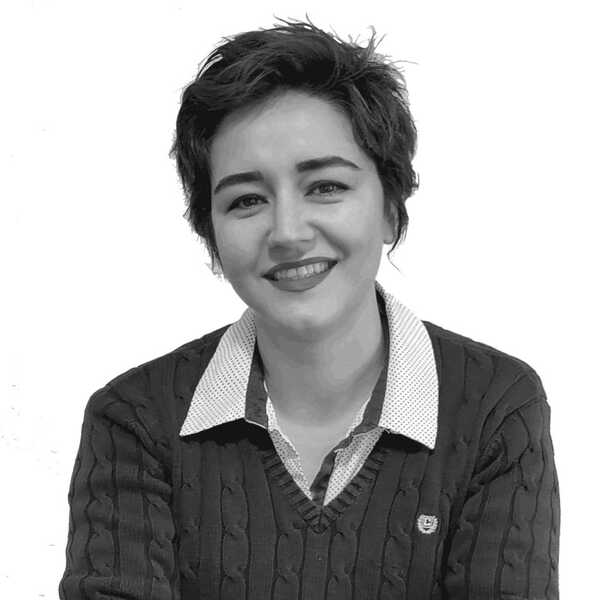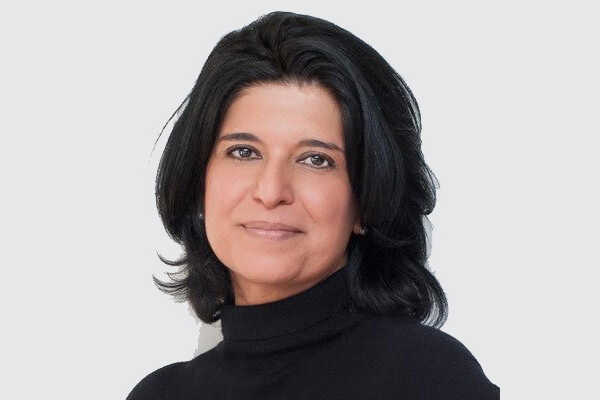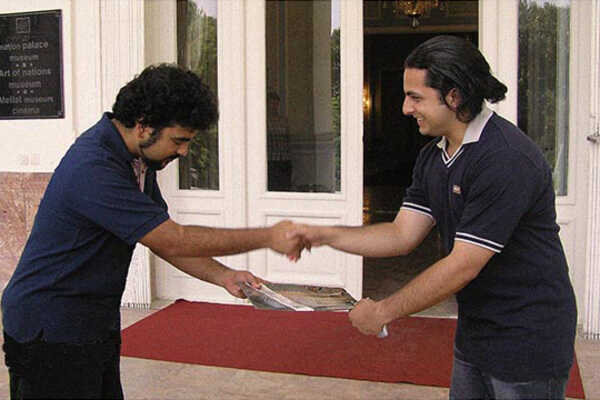
Raising Neem-Roonis- Interview with Azadeh Shams
Azadeh Shams is a toy designer living in Milan, Italy. She specializes in creating toys for children bilingual in both Persian and English. She has also become an internationally known expert on raising bilingual children, frequently appearing on the massively popular Man o To network. I became familiar with her work on Instagram, where she frequently posts videos on how to raise bilingual children, and often teaches by providing scenarios and offering multiple choice answers of how to deal with challenging situations.
I learned an incredible amount from Azadeh- she has such a respectful approach to raising children, one that I think would lead to the kindest and most sustainable way of passing on language learning. Because in the end, language is all about love and understanding- so it makes sense to use a gentle approach in passing on a language rather than an overtly forceful one. Azadeh is also graceful in answering questions not as a person who claims to be an expert, but as someone with a particular point of view. I hope you enjoy the interview- I learned so much from her! Be sure to check out the resource list at the bottom of this interview, where you can find out where to find Azadeh, with links to her intagram, youtube, webpage and more!
Enjoy!
Leyla Shams: First, I want to ask you to tell me a little bit about your background. Where were you born and where what is your language background?
Azadeh Shams: I was born in Iran and there until I was 19. So Persian is my mother tongue in every aspect. I'm fluent in reading and writing. And when I was 19 years old, I went to Florence to study product design. I lived in Italy almost 17 years. Then, when I finished my study, I went to New York. I lived and worked there for 2.5 years. And then I came back to Italy and I finished my study in design engineering and Politecnico di Milano. Now I started my own business. About the languages- I knowPersian- that's the language I'm most comfortable with. I know Italian and English. I understand German but I can't speak.
L: How did you learn English?
A: So many people in Iran went to English Institute so I learned it like that. And then, I love languages and I was interested in in English so I started to watch all the movies in English, and then I start even chatting with people. I remember when Yahoo Messenger came I was looking for some English people to chat with. This is the same way that I learned Italian actually before going. When you like some something you just find a way to learn it.
L: Where did you meet your spouse? And where is your spouse from?
A: My spouse has two different nationalities. His mom was from Switzerland, and his dad was from Austria, but they meet in Milan, and they raised the family there. They always speak German at home, and he went to the German school of Milan, so he's basically bilingual. We met in Milan.
L: And so then you ended up getting married and having two children. What are the ages of your children? And what language do they speak?
A: Diana is five and a half years old and Adrian is 21 months. I always speak Persian with them. When I knew that I was pregnant, the most important thing that we talked about was actually language because my husband is bilingual, and we are living in Italy. So he could choose which language we can go with them. But I said, I'm comfortable with Farsi, and I cannot even imagine speaking any other language with my children. Of course, it's about culture and everything, but it was my laziness also, you know- I couldn't have imagined to speak another language. It's not just saying 'ghorboonet beram' or these things. It's the whole 'me.' I mean, I couldn't be myself in other language. And so I said, 'Okay, you choose, whatever you want, I'm going to speak Farsi.' And then we decided to send them to the German school of Milan, for many reasons- it's a very good school. And so we said, she's going to learn Italian eventually, because we live here anyway. So my husband started speaking German with her at the beginning. It was challenging in the beginning, because he didn't know anything in Farsi and I didn't know anything in German, but both learned a little bit. So now, Diana knows very good Farsi and very good German. And I can't tell you now which one she is more comfortable with, because she speaks both of them very well. And she doesn't want us to speak any other language. Even if I speak something in Italian or in English to her if you're somewhere or for any reason, she just turns to me and says 'Maman, speak Farsi' after some moment. And with Adrian too- I always heard that the second children will know less of the mother tongue mother language, because the first try will always speak the common language. But in our case this is still not happening because Diana speaks Farsi with Adrian when I'm around and most of the time she speaks German with him when Franco is around. And so many times when they are alone together, where they're playing in the room he speaks Farsi. And he knows more words now in Farsi than German.
L: You are maybe the eighth or ninth person that I've talked to. And most of the people I've talked to have not been able to keep their children speaking Farsi. I think that there are some differences with people with international backgrounds versus people living just in the United States. But you talk a lot about the one parent one language- OPOL, which I've been looking up since since becoming familiar with your work. So can you talk a little bit about that and what you think the correct method of doing this is?
A: You know, language is not like teaching mathematics. There's much more culture in it and much more of ourselves in it. So everyone's just found a way to deal with it. Even with the OPOL method where they say everyone speak their own language, there are some challenges that everyone should find themselves comfortable with.
But I'd like to start by saying that there are some beliefs that maybe are not true. For example, when we're talking about politeness, we say if you're all Iranians and we have two American friends with us, to be polite, everybody speak English. I understand that it's for avoiding some misunderstandings. But I think when the child comes in the middle, we have to redefine politeness. I was talking about this with my husband. I told him when your German friends, Austrian friends come, don't worry about me. I mean, it won't offend me if you speak German. I don't care if you speak German with Diana or everybody else, because we're creating this environment for her for language acquisition. Because we don't teach our mother tongue to the children, they just learn it. They have to hear it, they have to interact with it. But, if they choose to speak it or not, that's something else. So I think so many people speak Farsi with the children when they're alone. But if American friends come, they switch because it's "polite" to do that. We have to redefine that when it comes to child. Another example- I speak Italian with my Iranian friends when we are at home. But if I when I turned to Diana, I always speak Farsi with her. Because the misunderstanding comes when the person doesn't know exactly what you're talking about. Maybe you're talking behind his back. But what can I possibly say to a two year old? I say the whole thing in Farsi, and in the middle just to send a message to other people about what I'm talking to her, because that's where the most misunderstanding happens. The other reason that maybe people say that it's hard to teach their mother tongue is when we speak, for example, Farsi at home with the kids and then we send them to daycare, they come back home with English words. This happens, I think 100% of the time. It happened to me- Diana came back home from school with Italian words. It doesn't matter. I continue to speak Farsi. That's very common, because she sees other children speaking Italian. And also the teachers in the school, they know that, for example, this child doesn't know Italian. So they continue repeating some words to her, very basic words like hungry, water, or whatever, they start repeating, repeating and repeating those words. And that's exactly the same method that we have to do at home. I don't believe in correcting.
L: I've been having a problem with this. My son just turned four last week, and he was speaking perfect Farsi. I only speak Farsi with him. And that's been a challenge because it's uncomfortable to be in a room with people, and they don't understand what you're saying, and you just have to persist. I think you're right, we have to change this perception.
A: This what I do. Usually it's because, for example, in our case it's important also for Diana to learn Italian. So when we are with Italian people, I really try to talk as little as possible. I'm going to say only the most important thing, maybe just two or three sentences in two hours, so I just leave her alone to hear Italian and interact with Italian people. If it is really necessary I go and I talk to her in Farsi. Another situation- what do I do when we are sitting, moms, dads and the children are playing everybody speaks Italian in our case, and Diana comes and they're fighting over something, they want toys and she doesn't want to share for example. The most common thing is that she comes and one of the children wants to take one of her toys home and she comes and says 'maman, meekhad asbab bazeemo bebareh, man nemeekham." I say "Okay, maman joon, boro behesh begoo keh, you can have it. But then you next time you come, you bring it back, please." So the sentence, as she has to say to the Italian kid, I tell her in Italian because she has a difficulties Italian too. So I will in that case send a message to all the people what I'm saying to my child. I don't care at the beginning, I speak Farsi, I don't care. But the sentence actually that she has to say, "Okay, you can have it" in Italian. This is one of the things that I do. And it works for me.
Leyla Shams: Well, I think that this is a bigger issue in the United States. Yes, they're going to school, they're speaking this majority language of the world. And it's the dominant language. It's the language of power. So we have a lot of issues here in general, it's just very difficult. I had gotten to the point, actually, before I was watching your YouTube videos and before I was listening to your advice, I had gotten to the point where I would get so frustrated. And I would just say, I don't understand, just speak to me in Farsi, which you say do not do at all.
Azadeh Shams: I mean, I wouldn't say don't do it but I don't think it's a good idea. Because the most important thing is what children are telling us, the mother language or second language, everything is just an added value to their life. If they don't speak it at the end it doesn't matter. I really think one of the reason that the Diana speaks Persian because I really didn't care that she has to say that, but I speak Farsi because it's more comfortable for me. I don't know, I know some second generation that said our parents forced us and now we thank them. Maybe it's good but I saw so many children that I'm still in touch with, my students in the US that don't like it because they say for example, 'I don't like when Khaleh Shahnaz comes. Because I usually speak English at home. But Khaleh Shahnaz comes and maman forced me to speak Farsi and I don't know some words. And I don't even want to go to sit with them, even if I like her. If I go there and say something in English, my mom corrects me, I don't like it, I leave.' But you still see some people that say our parents forced us and now we're okay, we thank them now that they forced us. I don't know.
Leyla Shams: Or more often you hear my parents didn't force me and I'm mad now. I hear that a lot.
A: That too. So it depends on the personality. We can't set a general rules for everyone. For example, if we exclude the United States, Australia and Canada, over 65% of the people of the world are bilingual. By including the United States that just drops down this statistic, because just 20% of the people in United States are bilingual, so they drop down the world's statistic to 43%. Another example, look at Iran. I don't know if there's an official statistic about this but over 70% are bilingual. There are all the other languages too- Azerbaijan, all the South Iran, Kurdistan, they are all have their own languages. And they know Farsi, of course, because it's the language of TV and schools. So in Europe, we are used to hearing more languages. And I think that's it because now I mean, Milan is we drive like half an hour toward North Europe and Switzerland, like 2 hours south, we arrived in France in two hours is to be right in Germany. So we are used to hearing more languages. In the United States, usually, if we exclude California and New York, the rest is not used to high class immigrants. So they don't look at it as a value to know another language. In Europe between Italian, German, French or Spanish, you can't say which one is better, or which one is dominant.
L: What I'm taking away then, from what you're saying and what I've taken away from your videos, watching them this past few months, is that you can't control what the child does. But you can control what you do and you do something out of love, because that's the language that you best express your love to your child. And so maybe they'll speak it and even if they don't, at least they understand it. And so they can do it at their own will. So you're not forcing the child, you're respecting them.
A: Exactly. Because if we don't force them, we respect them. We create a better relationship within our ourselves within parents in a better parent child relationship. And when this relationship is better, it's easier for them to to catch what is from outside.
L: So now practically, what's going on at your dinner table?
A: Oh my god, that dinner table is so... whenever I have friends come over, they say, 'Oh, we have a headache. How many languages?' I mean, I speak in Farsi with Diana and Adrian, and they speak German with their father. And if I want to say something, for example, I say 'Diana beh baba begoo emrooz cheekar kardee'- Franco understands that I'm asking Diana to tell him something, but he doesn't know what. So we switch, we translate, or sometimes we even don't. You know what I think- we sometimes underestimate our partners. Because I hear so many people say I speak German, I speak English at the dinner table, because I don't want the father to be excluded. Yes, I understand that completely. But I understand if actually, the father actually said, 'Do not speak Farsi because I want to be included.' Because I'm saying, as a parent, that my children speaks a language that I don't understand, and it's just fascinating. I don't understand what they're talking about- I just look at them. I think, Oh, my God, look at this, she is just four years old, I'm almost forty. And she knows this language that I don't. I just admire them. Maybe they're fighting, you know, but I'm looking at them, and I admire them. So please do not take this nice feeling from your partners. Because I think if they really they love the family, and they know the value of languages, they will admire this too. So unless they actually tell you that I don't want you to speak Farsi, other than that, I think we have to talk about this. And this is very nice. I mean, why should I really know? I mean, sometimes I'm happy that I don't know what they're talking about. Because I know, I will interfere.
L: So they have their own relationship in that language, and that's okay.
A: Yeah, it's okay. I remember for example, when we were in Austria, Diana asked something about the cross. And we never had the religion discussion with Franco- I think the only religion discussion that we had, he asked me 'Do you go to mosque on Fridays' and I said 'No, do you go to church on Sunday' and he said 'No,' and I said 'Do you put the cross on her home,' he said, 'No, you want to put Allah above the living room,' and I said 'No,' and that's it. And then we didn't discuss anything else. And I remember she saw the cross with Jesus on it. And she asked something, and Franco starts talking. And in that case, I'm pretty sure if the discussion was in Italian or English, I would have interfered. And probably it wouldn't be good, because then she will know that we're not in the same page, or I don't know. So later, I asked, what was she asking about? And he said 'She asked about the Christ, and I said this, and I said that.' So I said, 'Okay, the next time she asks about religion it's better if we answer like this.' But, in that moment, I was happy that I didn't understand because otherwise I would have interfered. So we can look at this in this way, too. I mean, we should not know everything that is going on.
L: That's nice. I love that. I love that perspective. Well, so you've answered this, in a lot of ways. Is it important to pass your that language on to the next generation? In particular Farsi?
A: I think it is, to teach every mother tongue, every different language. Because as Arash Karami was telling you in the interview, which I really enjoyed, that it's the emotions we give to our child, to give them a rich life. If we have the rich emotions, we have a rich life. And I know if she sees, for example, an Iranian movie or Iranian song, she feels something, she has something that maybe for her friend doesn't happen, that just gives more value to her life. And I think that's the most important thing that we can give them, rich emotions, rich point of views. It's not just a language, it's not just the words together with the grammar. It's the whole culture, it's the whole point of view. And I think that people who know more cultures, they are less racist in any way, not towards human beings with any kind of points of view. If you see the life as a garden with these old houses, they have so many windows, and every language, I think, is one of these windows. So if we know more, we have more points of view toward this life. And if we can, we have to do it, if we have this opportunity, we should give it to them, I think.
L: Right. That's wonderful. Well, to close, I would like to ask you, can you tell me a bit about the products that you create? You have a lot of different products from your design background, physical products, and also have some digital downloads on your website. So can you talk tell me about those a little bit?
A: Sure. I wanted to teach Diana the Persian alphabet before she she learned the Latin alphabet. And I just created some toys for her at home, you know, small things. And then I thought maybe it can be interesting for other parents, and I took them to the next step. And now I have four toys produced and I have it on my website. Some of them are available on Amazon and some of them directly through the website at www.azitoys.com. And Random, for example is a very good game we play with dice. And here in Milan, for example, many language institutes play with them, because we can play in so many languages with it. And I made some worksheets with a Persian alphabet that you can download for free from my website.
L: Well, thank you so much for talking with us. It was a really fun conversation. And I learned a lot. I think I know some things I'm going to do differently now.
A: Thank you so much for inviting me. And I'm so happy to talk to you.
Resource List
- Azi Toys- The place to find the toys and worksheets Azadeh has put together
- Azadeh Shams Instagram Page- Where Azadeh is most active- great content for parents of bilingual children
- Azadeh Shams YouTube Page- Videos of topics for parents raising bilingual children


